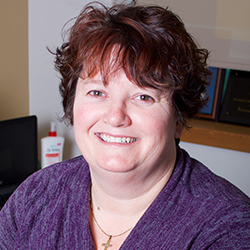In the Spotlight
Arlene MacLennan RPN/BSc.MH
 Manager, Specialized Mental Health Services
Manager, Specialized Mental Health Services
What does a typical day look like for you?
It varies. I could be participating in bi-weekly transition meetings with other members from community, hospital and SMHC to identify any barriers to discharge for specific patients and assist with discharge plans if possible. I may also visit one of the four teams I'm responsible for: either one of the Program of Assertive Community Treatment (PACT) Teams - Hargrave, Leila, Winnipeg West, or Early Psychosis Prevention and Intervention Services (EPPIS). I could be reviewing referrals received by PACT and sending the referral to the appropriate team for intake and assessment.
I also I spend time working on current projects related to the programs, ensuring consistent practice between the teams to meet participant needs. I might also be involved in interviewing staff for positions. And I work with other agencies to develop partnerships and advocate for participants to receive services as needed.
What led you to the work you do, and what inspires you about it?
I've always been interested in the area of mental health and spent the majority of my career in that field. A co-worker told me about a new program in 2000, called PACT, that was hiring staff. I applied at that time as it was focusing on working with people in the community with high needs and was based on recovery principles.
I'm inspired by the individuals we work with as they identify, work towards and achieve their goals. It's a privilege to work with people who are working on their recovery and to be part of that process alongside them. It has been amazing to see the strengths and talents that people have.
In my current role I don't have as much direct contact with participants, but I hear about their accomplishments and am very proud of the participants and the staff who work with them. I also work with a passionate and dedicated group of staff, and the work that they do daily is inspiring.
The demand for mental health services is skyrocketing. How do you manage the pressure that that places on you?
I'm fortunate to work with teams that are collaborative and that support each other. We always look at ways to prioritize those with the highest need. However, there is a growing need for mental health resources and part of my role is to advocate for increased resources. I also have a very supportive senior leadership team that I can discuss concerns with and seek guidance from. I also believe the relationship between the various agencies has become stronger and we are all trying to work more collaboratively to ensure people receive the services they require.
How do you see your role changing as public awareness of mental health issues increases? Is the balance between health care provider and health care educator shifting?
As public awareness of mental health issues increases, I see my role as being part of that awareness. People need help to navigate the health care system, and I hope that in my role I would be able to assist an individual, their family or another service provider to receive the services they require. Sometimes this involves some creative problem solving. I think any conversation I can have with people about mental health and de-stigmatizing some of the perceptions that exist - especially for those with a severe and persistent mental illness - is one way to change the type of awareness people have. All of us can be impacted by mental illness, personally and in our professional roles, and we need to remember that it can be personal for a large number of people we meet. Education can be delivered formally or informally and anytime we can discuss mental health and the need for mental health resources, I think we should do it.
How do you engage your co-workers when they're feeling the strain of stretched resources?
I have a great group of team leaders who have a keen awareness of how their team members are managing - they're very good at supporting their staff. The teams also meet regularly and can raise their concerns. When people approach me with frustration about stretched resources I try to explore with them things that we can do that might be outside the box, but could help someone get the supports they need. People also need a chance to discuss their frustrations and I will always listen and advocate at different levels for more supports.
What does excellence mean to you, as a psychiatric nurse?
To me, excellence as a psychiatric nurse means that all the work I do, whether clinically or administratively, is done to ensure that people living with mental illness are receiving the highest standard of care possible. It means believing in recovery. As my role has moved away from direct clinical work I also see the importance of being able to identify and support the staff and providing what they need to do their jobs.
Being passionate about recovery and the journey that people allow us to witness is also a key component of being a psychiatric nurse, and you need to believe in people to excel in this area. Being involved with the Investigation Committee for the College of Registered Psychiatric Nurses of Manitoba also allows me the opportunity to reflect on the standards and Code of Ethics to ensure I'm following them and that they are demonstrated in the work environment.
Your work is extremely demanding. How do you refuel and recharge when so much of your role is centred around supporting others?
I work with a talented group of team leaders and staff who make it easier to be in this role and who work to support each other. I have excellent support from senior leadership and can address concerns with them. I am also refueled when I hear about the success that a participant has had or that the team has reached one of their goals. It is always rewarding to see people succeed. Most importantly for me, I have a really supportive family and they always help put things in perspective for me.
Who have been your mentors? Do you look outside the field of nursing for inspiration?
I have been fortunate to work with a great number of people who have helped me develop and grow. Annette Osted, the previous Executive Director and Registrar of the CRPNM, has been a huge influence in understanding the role of psychiatric nursing and the need for our discipline. Marlene Fitzsimmons, who is also a R.P.N., was a great role model in regards to psychosocial rehabilitation.
What gets you up in the morning and keeps you coming back?
I truly believe that all people deserve to have the best quality of life possible and that people can and do recover from mental illness. It is this belief that drives me to do the work I do and to try and ensure that people have access to services, and if not, to look at ways to remove the barriers.
